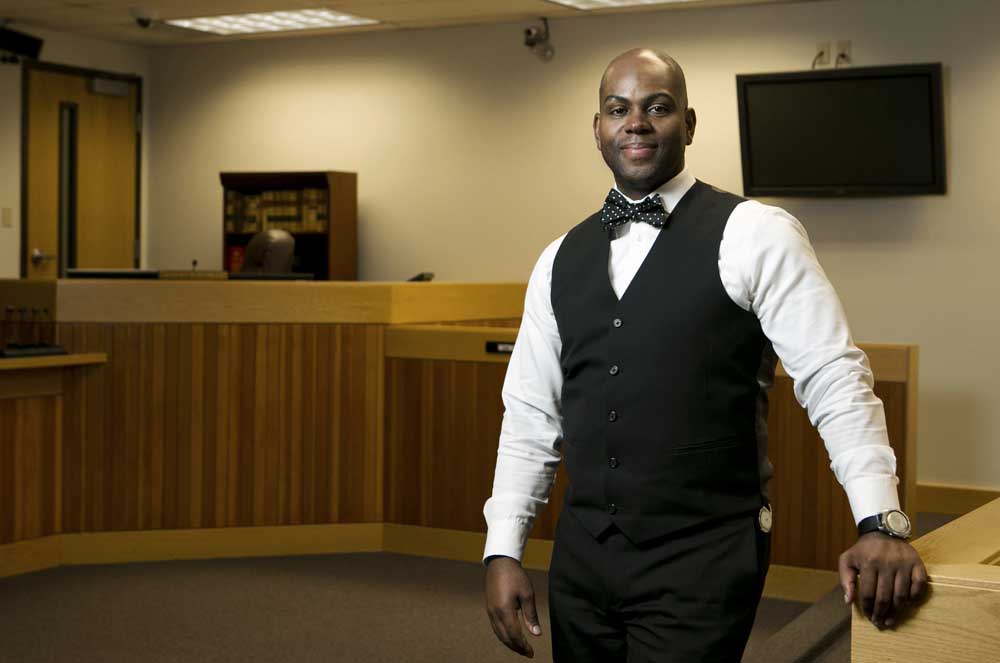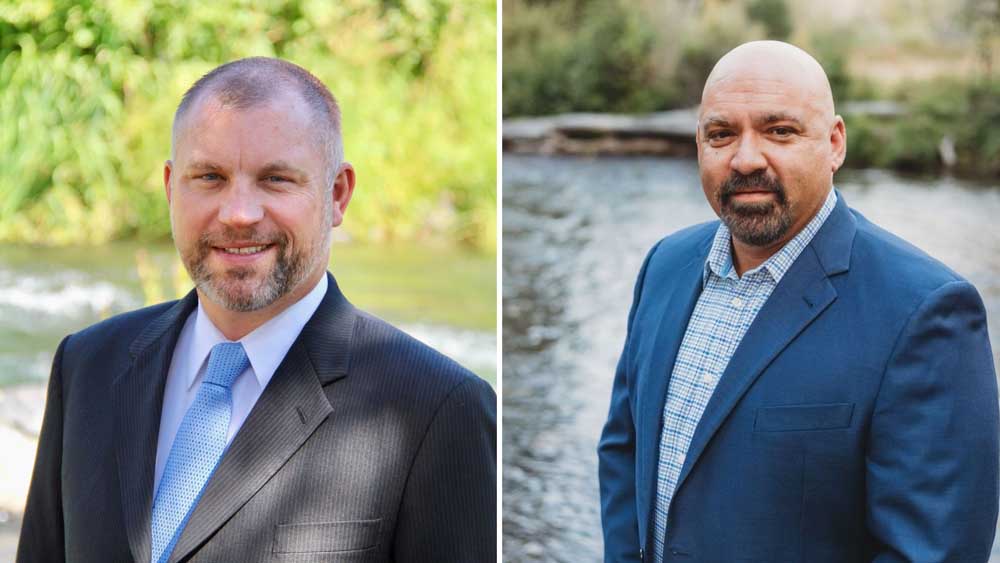Crutchley brings unique experience to judgeship
Published 12:00 am Wednesday, April 4, 2018

- “The thing to understand about unconscious bias is everyone has unconscious bias — we’re just wired that way,” Deschutes County CircuitJudge Ray Crutchley said.
Ray Crutchley never thought he would see a day like March 2.
He grew up impoverished in a conflict-ridden nation with a single mother.
Trending
That day last month, family from around the country and supportive colleagues watched the 49-year-old attorney become a Deschutes County Circuit Court judge.
It was consummation of a life spent serving and working hard, and a lesson in what a driven person can do when given a little opportunity.
“It’s not exactly Horatio Alger, but it’s kind of like that,” said friend Dale Russell. “It’s an inspiring story, and not just for minorities. Anyone who reads his story can only be inspired by it.”
Raymond Dean Crutchley was born in rural Jamaica in 1968, the son of a 17-year-old mother and a father who, for years, didn’t believe the child was his. He was shuttled among his two grandmothers, his mother and an assortment of aunts, cousins and friends — basically, a whole community helped raise Crutchley.
Jamaica in the 1970s was not the cruise-ship ideal of reef-lined beaches and hardship-free resorts. Jamaicans were each affiliated with one of two political parties — the People’s National Party and the Jamaican Labor Party — and those connections ran deep.
Crutchley remembers upheaval and fierce, sometimes deadly tribalism. The killings and assaults were worse as elections neared, he said.
Trending
He wasn’t aware of everything going on around him, but he doesn’t recall a horrible childhood.
“I saw people pull together,” Crutchley said as he sat in the sparse office he has right behind his courtroom. “That’s what Jamaica taught me: People brought up in those circumstances learn to pull together to survive to make a better community.”
In 1980, opportunity knocked. Crutchley’s uncle, Michael Edwards, sponsored the 11-year-old boy and his mother to move to New York and live with his family in their two-bedroom apartment in Jamaica, Queens. Edwards had founded a fast-growing church in the Queens community of St. Albans — the United Apostolic Tabernacle, which is still around.
New York in the 1980s was lively and colorful, remembers Russell, who met Crutchley in junior choir at the church.
“Ray was personable, easygoing,” Russell said. “He doesn’t get upset easily.”
Russell soon talked to an employer about hiring Crutchley in his shoe shop, Simco, in the Jamaica Avenue shopping district — a decision the employer didn’t regret, Russell said.
Crutchley graduated from Jamaica High School and wanted to join the Marines. But he was 17 and needed his mother’s permission.
She wouldn’t give it to him.
“She insisted, ‘You will go to college,’” he said.
He attended nearby City University of New York-Queens, studying philosophy. By this point he’d started working at Gibbs, the high-end men’s shop next door to Simco.
When St. John’s University basketball star Mark Jackson was drafted in the first round by the New York Knicks in 1987, he went to one of the upscale clothiers nearby. And when the Knicks showed off Jackson at his inaugural press conference, he was a wearing a suit Crutchley helped him select.
Back then, Crutchley was in class every weekday morning until lunch, then working from 1 to around 8 or 9 p.m. That didn’t leave much time for studying, and after two years of being pulled in different directions, he left for the Marines.
He became a subsistence supply clerk, keeping mess halls stocked. His precision and attention to detail proved useful in helping organize and operate new accounting software while operations Desert Storm and Desert Shield raged overseas.
In 1991, he became a naturalized U.S. citizen.
The next year he was honorably discharged from the military.
The GI Bill helped pay for the remainder of college, and Crutchley settled on law school. In the months before the fall term, he interned at an admiralty law firm on Wall Street.
Every law school Crutchley applied to accepted him.
“I probably applied to too many,” he said.
He selected Lewis & Clark Law School in Portland because of its apparent determination to diversify the school and the Oregon legal community.
After law school, he worked for 15 years in civil litigation and as a criminal defense attorney representing indigent clients.
In 2015, he came to the Deschutes County District Attorney’s Office. With his background as a trial lawyer, his office became a common stop for other prosecutors seeking help on a case, according to friend and former co-worker Dan Reesor.
“A lot of us called him our voice of reason,” Reesor said.
Crutchley took part in community outreach, volunteering for the American Constitution Society’s “Constitution in the Classroom” project, bringing lawyers and judges face-to-face with students to discuss their constitutional rights.
Summit High School social studies teacher Patrick Kilty said when community members speak in classrooms, it’s hit-or-miss, and Crutchley was a definite hit with students.
He drew in students with Socratic questioning, and when a student would offer a soft answer, Crutchley would “hold” them.
“He was just a calm, cool, engaging man,” Kilty said. “He speaks precisely, and forces you to follow him, as opposed to overwhelming you with his personality, like a lot of lawyers. He is the opposite of bombastic.”
That quality was evident when the governor’s office last year sought candidates to replace retiring Judge Alta Brady. Crutchley, by all accounts, had no interest. The Marine was enjoying working with a team in the DA’s office, something he missed in private practice.
“I kept telling him, ‘Go on, you gotta do this,’” Reesor said. “And he said no. Straight-up. But that’s just who he is. He’s the most humble guy I know.”
Friends, including his boss, District Attorney John Hummel, asked him to please think about it.
“I essentially never took it seriously,” Crutchley said. “Then people asked me to reflect on my path here. And you begin to realize you have a diversity of experience that lends itself to serving as a judicial officer. As a judge, you’re meeting people from all walks of life, so I think it’s important to have a good sense of what people go through.”
Crutchley and his longtime partner, Janelle Yarger, a flight attendant, share an immaculately tidy home in Bend with their chihuahua, Angel, and Crutchley’s home gym. They host a popular Super Bowl party, notable for including legal professionals, from judges to defense attorneys to support staff.
He keeps in touch with his large family, including five brothers and a sister from his dad’s side and a much younger brother on his mom’s side.
Several of them and Dale Russell attended his investiture ceremony March 2 to watch him become the first judge in his family and the first black judge in Oregon east of the Cascades.
A stylish dresser from long ago, Crutchley’s friends wondered how he’d take to the drab attire a judge must wear.
“When you’re wearing a robe, there’s not a lot of opportunity to make a fashion statement,” Reesor said.
So Reesor was amused when he spotted now-Judge Crutchley’s answer to the dilemma while walking through the courthouse: a bright bow tie.
— Reporter: 541-383-0325, gandrews@bendbulletin.com








